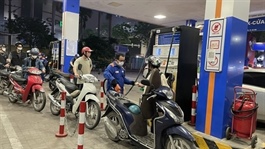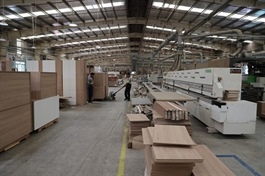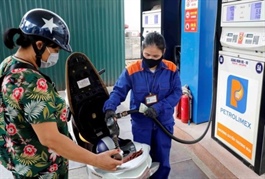More car tax cuts to stimulate demand
More car tax cuts to stimulate demand
A proposal on a vehicle registration fee cut, if approved from August 1, could be a god-send for the automobile industry.

With aims to reinforce the supply chain and restore growth in the domestic vehicle manufacturing and assembly industry, the Ministry of Finance’s (MoF) wants to half registration fees for domestically produced and assembled cars from next month until at least the end of January 2025.
This would be the fourth consecutive year that the preferential registration fee policy has been implemented in that period. If approved, businesses hope it will contribute to stimulating demand for cars in the market and supporting economic development.
Nguyen Cong Quang, sales manager at Mitsubishi Cau Dien in Hanoi, said, “I think that reducing registration fees is a necessary measure from the authorities to help the domestically assembled car market. We expect that when the registration fee reduction is applied, the growth number will be about 20 per cent compared to the time of registration tax reduction in 2023.”
Also appreciating the proposal, economic expert Dinh Trong Thinh said, “Reducing car registration fees is one of the measures that we have implemented over the years, and it has had a good effect on the consumption of manufactured and assembled vehicles. Although it may decrease registration fees, it will increase the number of domestic vehicle sales, thereby increasing special consumption tax and VAT revenues.”
Economic difficulties causing a decrease in purchasing power are the main reasons affecting the output of domestically produced and assembled cars. Since the beginning of 2024, although car manufacturers and dealers have launched promotions and direct sale price cuts to stimulate demand, sales still have negative growth and the auto market has not yet escaped recession.
“Car consumption demand depends on many factors and fluctuates. Therefore, if the registration fee is reduced, consumers will be the first to benefit. Support policies will help people access good prices and stimulate shopping in the context of the auto consumption market trending towards a sharp decline,” said Nguyen Van Quyen, chairman of the Vietnam Transport Association.
Vietnam’s automobile market in June remained in a stagnant state and, although consumption has increased slightly, it has not yet made a breakthrough.
According to a report last week announced by the Vietnam Automobile Manufacturers Association (VAMA), total sales of member units in June reached 26,575 vehicles of all types, an increase of 3 per cent compared to the previous month. Among them, the number of passenger cars sold reached almost 20,000 units, a climb of 9 per cent; commercial vehicles reached over 6,400 units, down 12 per cent; and specialised vehicles decreased by 21 per cent on-month.
However, compared to the same period in 2023, the total number of cars consumed in June still rose by 12 per cent.
Last month, the number of domestically assembled vehicles sold reached nearly 13,000, an increase of 8 per cent compared to the previous month, while imported completely built-up vehicles decreased slightly by 1 per cent, reaching 13,600 units. However, the number of domestic-built cars sold is still lower than imported cars.
In the first six months of 2024, the total capacity of the Vietnamese vehicle market of VAMA member units reached nearly 135,000 units, a slight decrease of 2 per cent compared to the same period in 2023.




























